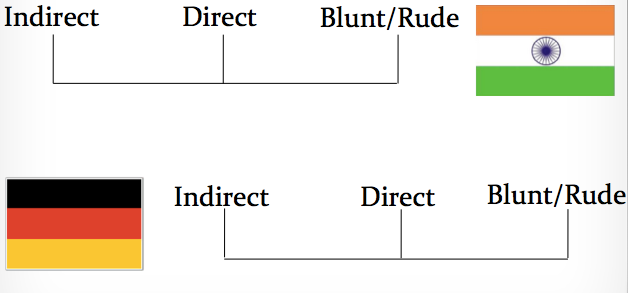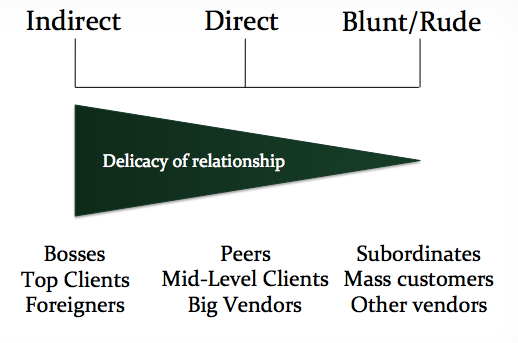It is standard practice in the world of cross-cultural knowledge to say Indians are indirect in their communication. And it is true. Sometimes.
You have likely interacted enough with India to know that such a simple and generalized statement will break down eventually.
Indians can be very direct and very indirect, all depending on the context.
Before we get ahead of ourselves, let’s hear from one of the great modern writers on India.
Craig Storti’s Model
In 2007, Craig Storti gave the world an extremely helpful framework for understanding the differences between communication in India and the West. His book, Speaking of India
described a communication spectrum with indirect communication on the left, direct communication in the middle, and rude or blunt communication on the right side.
To summarize, indirect communication is heavily non-verbal, using body language, intonation, inflection, or sarcasm to encrypt a meaning in a package the sender hopes the recipient will understand.
Direct communication is focused on getting information across to someone and places emphasis on the literal meaning of phrases.
Rude communication is very forceful and is perceived as overly blunt.
Storti’s most valuable insight into these spectrums is that each culture has its own unique definitions for each of these three styles. For example, if an Indian must refuse an invitation to attend a wedding from her boss, here are three responses she might give:
Indian Indirect: Wow, thank you so much for the invitation. I’m sure it will be a very great time. I will do my best to make sure I am there.
Indian Direct: Thank you so much for the invitation. It would be a real honor to attend. I have a very important family commitment I must attend that day, but I will try to come.
Indian Rude: Oh, I’m sorry, but I won’t be able to come to the wedding, as I have something else happening the same day.
Now let’s look at definitions of the same terms by a different culture (Germany for example).
German Indirect: Thank you for the invitation. It would be nice to come, but I have a very important family commitment that I must attend. If I am able, I will come.
German Direct: Unfortunately I won’t be able to come to the wedding, as I have something else happening the same day. I hope it is a great time.
German Rude: I do not want to come to the wedding and cannot make time for it.
Storti juxtaposes these two spectrums to show how they don’t line up exactly like each other.
In fact, you might see that the German indirect looks a lot like the Indian direct, and the German direct like the Indian rude.
This insight alone has helped thousands of people working with India and other “indirect” cultures. Most of us never realize that different cultures define the word “direct” in very different ways. And when you are asking your Indian reportee to be more direct with you, they might be saying to themselves “I am being direct!” It’s just that you are still hearing it as indirect.
But there is a deeper layer to this model you need to know.
As mentioned earlier, the majority of studies you will read say India is more indirect than other western countries.
But that is not always true…
If you’ve been in India, you know that Indians can be pretty direct with each other, especially in the office. There was one visiting foreign manager who was shocked to see how a man she thought was very meek ended up yelling at his subordinates in front of her. Expats living in India are surprised how rude a government clerk can be in speaking to someone trying to submit a form.
Here’s a helpful addition to Storti’s model that gives you a more complete picture of what is going on.
Relationship Delicacy
In India, and most of the world, the choice to use indirect, direct, or rude communication (especially in terms of giving negative information) is most heavily based on the delicacy of the relationship.
Delicacy of relationship means how sensitively you need to treat a relationship and particularly how much you have to lose if the relationship breaks down as a result of something you said. A delicate or fragile relationship requires you to be much more careful in what you say, and hence more indirect. Indirect information is the safer option because it encodes the message in a way the sender hopes the receiver will interpret without being offending. #Thinskinned
Here are some examples of highly delicate relationships in India: bosses, top clients, and foreigners. Each of these groups receives more indirect communication because the giver of the information is a little unsure how they will respond, and they have a lot to lose if the relationship falls apart.
Moderately delicate relationships are peer-level relationships, mid-level clients, and big vendors. These groups will usually get direct communication since the relationships are important, but not as fragile.
The least delicate relationships in India are subordinates, support staff, mass customers and low-level vendors. These groups generally get blunt communication since there is no real fear of the relationship breaking down, and not much to lose if they do.
Why are foreigners on the most delicate list? Don’t they know I want direct communication?
If you are a foreigner, it is hard for Indians to put you into the second category (where you probably want to be), mainly because for most of their professional lives, speaking directly to someone is equivalent with not respecting the relationship.
In India, the phrase atithi devo bava means the guest is god. A visiting foreigner is a guest and should be treated with respect, and you show respect by not being too direct. There are countless Hindu mythological stories told to children where a guest comes to visit someone and ends up being a god incognito. These stories reinforce the idea that you should be careful in the treatment of guests.
It takes a lot of practice and time for an Indian to be comfortable giving direct communication to a superior and to a foreigner.
An example:
A foreign manager, Jerry, was visiting India for the first time and his team members showed him around the city. Towards the end of his trip, Jerry visited a handicrafts store where an artisan was making glass figurines. Jerry put out his left hand to accept a figurine, but the glass blower frowned and refused to give it to him. Finally the artisan pointed to Jerry’s right hand. Jerry then extended it, and the artisan gave the figurine to him with a smile.
Jerry didn’t know that in India you should always give and receive things with the right hand and not the left.
Being left-handed, Jerry was embarrassed to think back to his entire trip and all the things he had accepted or given with his left hand. He was upset with his team because the entire time they were with him, they never corrected him, and Jerry was afraid of all the other cultural gaffes he had made.
For his team members, because Jerry was a boss and a foreigner (perceived as a super-delicate relationship), they did everything they could to make him feel welcome, including not criticizing/correcting him and being very indirect. However, the artisan saw Jerry as a regular customer, and could afford to be more direct with him. #CustomerIsAlwaysThere
Are all Indians Indirect?
If you notice, the writers and theorists who say Indians are all indirect generally all come from the top category of more delicate relationships and are usually given deferential treatment. That’s how this myth got passed around that all Indians are indirect in their communication. As the global market expands and India takes a larger role, it will become clear there is much more than meets the eye (or ear).
Remember these two foundational points as you communicate in India:
-Different cultures define the terms indirect, direct, and rude in different ways, and probably not like you do.
-The biggest factor in determining how direct an Indian chooses to be is the delicacy of the relationship.
In future posts, we’ll talk about
- All the things you are not hearing your Indian colleagues say
- How to use the communication spectrums
- Why Storti was wrong about westerners being direct
- Why you should think more about the order of your communication








This makes me think about something my husband and I noticed from Indians, they don’t like telling you bad news. We kind of joke about it, but based on truth we say: “there will either be good news or silence.” Whenever there were good news, they would tell us right away, but if something didn’t go as planned such as the custom windows not being ready when they said they would, they don’t tell you. And if you ask, they still don’t tell you the truth that maybe is “10 more days” or “we have no idea when they’ll be ready.” but instead they say “tomorrow” which is not true. Point is, they avoid telling you bad news.
Totally spot on, when travelling in Nepal/India it was almost impossible to get correct information after flights were cancelled or something wasn’t going to plan. Everyone was terrified to give us bad news and instead came up with excuses or shut down and avoided conflict. It led to interesting situations where we got far more frustrated with being supplied with incorrect info or none at all rather than bad news..it was very difficult to problem solve because we had no idea what was happening!
in Hindsight its funny..but stretched my patience to the limits at the time!
Very interesting article! May i ask under which category relationships such as friend, neighbors, and couples fall?
Thanks,
Meital, Singapore
Thanks, glad you liked it! Good question about friends, neighbors, and spouses. Of course things will vary from person to person, but I would generalize by saying that most of these relationships would be more on the Indian version of direct. The relationships are important, but unlikely to be extremely fragile. I’ve seen Indians be very direct with friends and family members, but not usually to a rude level.
I found this site because I was just given the worst insult of my life by an Indian woman and I was trying to figure out it she was just rude or if it was a cultural thing.
Background info: I have 4 children, ages 4, 3, and 1 year old twins. I am currently pregnant again with baby #5 and she said, “Are you pregnant again?” I said, “yes.” To which she responded, “What…….you don’t love your kids?”
I told her how offensive that was and that it was none of her business how many children my husband and I have or how close in age they are, then I went shopping (she is a greeter at a grocery store).
I cannot think of a single thing that would be more offensive to say to a mother!!!
Wow, that’s a bit of a shocker! I’ll ask around for a better explanation; that one is outside my knowledge. I know most modern Indian families cap off with 2 kids, but I’ll let someone else weigh in here.
Thanks, she is usually very nice so I’m not sure what to think about that comment.
I am reacting to Ms.november684’s (abbreviated to 684, with due apologies!) comment below, to give my perspective.
At the outset, I would say the lady in question was not being rude, but was trying to show concern about the up-bringing of 684’s kids. Let me explain.
India, atleast prior to 1970s has been a country where family-planning was quite un-heard of. People had as many kids as they could. It was a general belief, irrespective of religion, that God gives kids and humans have no right to stop the procreation through pills, condoms or any other forms of sterilization etc. With the effect that India in those generations was marred by high degree of infant mortality as well as maternal mortality during child-birth (public healthcare was poor as the economic growth came in 20-30 years later). It took a massive efforts by successive governments to bring in the social acceptance to controlling population growth and limiting families to initially 3 and later on 2 children. Several incentives were given for sterilization and disincentives were given for people with more than 2 children (barred from applying to government jobs, no maternity leave beyond the 2nd child, etc.). However, unlike in China, there is no penal action for those who decide to have more than 2 children. Various campaigns were made and the one that really stuck is that a family can take better care of its children, provide them food and proper education, bring them up as model citizens, if the are no more than 2 in number. All of us in India are now brainwashed into believing the same – to the effect that even the richest of Indians who can really support dozens of children have no more than 2/3. Mukesh Ambani has 3, Narayanamurthy has 2, Venu Srinivasan has 2, Anand Mahindra has 2 and Kumaramangalam Birla has 3. Having no more than 2 children now, almost all of us in India believe is a responsibility that we are undertaking for the benefit of the country, for our children and for the sustainability of human race and mother earth (scarce resources being insufficient for overpopulation). It has also come to a stage that people with more than 2 kids (for whatever reason) are socially shunned – at work place, in clubs, in hobby groups, in apartment complexes. Even if there is parity on every other parameter – education in ivy league institutions, station in life, earnings, family wealth, professional position etc.
It is ironic that even the most educated and upwardly mobile people of us (me included), when we travel abroad or meet foreigners who come to India and find that they have more than 2 kids, involuntarily withdraw and have passing unbecoming thoughts about the people in question. We quickly get over it and mind our business.
Which obviously did not happen in the case of the lady who spoke her mind to 684. The lady was rude in saying it out, but she certainly is not the only person who felt that way. And it is purely cultural and not in any manner trying to be wicked or rude that most people in India feel so about parents with more than 2 children.
Thanks, Sreedhar! I should have let you written a full article on the topic!
Thank you for finding someone who had a better understanding of the situation. He described it in a way that made perfect sense. Although I still think she should have kept her comments to herself.
Sure, that’s what the site is for. Something are just plain tough to handle even if you understand the ‘why’. I’ve been through a lot of those!
Thank you so much for giving this insight. I thought this might be the case but wasn’t sure. I know regardless of culture, religious beliefs, etc. that some people start to judge after the 4th or 5th so I was expecting some kind of negative response, just not quite that bold. Usually people are a little more guarded in how they speak to you regardless of what they are thinking. I’m also not naive enough to think that she is the only one thinking these kinds of thoughts; if one person voices their opinion you can be sure there are more who agree.
On the other hand, we have a small family farm and can provide most of our food ourselves at no cost (outside of the work put in). My husband works a regular job for the extra money needed and so our family has insurance. I’m also a stay at home mom (I run a small business from home) so I spend plenty of time with my children. I could see if a woman worked outside the home and had 5 kids she may not have much time to spend with them.
With this (unplanned) pregnancy, we have more children than anyone else we know in our age group OR anyone else married the same year we were (there were a lot of weddings the summer of 2008 in our pier group). Most people our age that we know only have 1 to 3 kids at this point. It’s not that we haven’t tried to space the children further apart or prevent pregnancy, it’s just that what we have tried has not worked for us. We are limited in the forms of birth control that we are comfortable using (although there are a few more options to try). I always wanted a large family but planned for them to all be about 2 to 3 years apart, that obviously did not work for us.
I think that the woman who insulted me was OK with the fact that we had 4 kids because it was only 3 pregnancies, so on the high end of “normal”. Maybe she figured it wasn’t my fault that I happened to have twins on the 3rd pregnancy, but she thinks I should have prevented this one.
I work in a call centre for a large multinational IT corporation, and we get many callers from India. We open cases for technical support for devices the customers are using. I guess we must be seen as “support staff” because communication always veers towards the rude end of the spectrum. Indian callers will frequently say “Get me assistance now” instead of “hello” at the start of a call or “yes, tell me” when I take them back off hold.
When I began reading this article I found it difficult to believe the sheer level of politeness described in Indian indirect communication. That just hasn’t been my experience whatsoever.
Perhaps the folklore of the foreign guest being a god incognito could extend to us foreign people on the phone. We are a guest on your telephone line, and we could be a god. Or maybe all humans could just be treated equally, regardless of what little we stand to lose if a relationship goes sour?
I guess I sound like I’m coming close to regarding certain cultural norms as wrong or bad, or coming across a little bitter about my past interactions. I’m happy to accept any culture on its own terms, not mine. So I won’t treat Indians with disrespect based on their cultural mode of communication. I will continue to treat them like any other human being, with courtesy and care, while questioning the logic behind the culture that makes them treat me with such disdain as to use the “blunt/rude” mode of communication when speaking with me.
It just kinda hurts, because I obviously regard them more highly than they regard me.
I totally get what you are saying, and feel sorry that it feels like you are being disrespected and not valued.
The unfortunate truth is that you are definitely on the wrong end of the spectrum when it comes to direct communication. Support staff will always be viewed as someone that can be pushed around and taken for granted, because there isn’t anything to lose.
I hope you persevere in treating others with courtesy and care. It is the right path to take.
One point that might help you:
Some things are just based on vocabulary. In Tamil, when you greet someone, you use the phrase that is translated as “Tell me”. However, Tamil (like most Indian languages, and unlike English) has a formal and informal form: ‘solunga’ and ‘solu’. But both of them are translated as “Tell me” when they learn English. So although they may think they are being kind (in using the formal tense), it still comes across as rude to the listener.
Thanks so much for the quick reply!
Wow, that really makes a lot of sense, with regard to the “tell me” choice of phrase. It remains impossible to tell whether the caller means to use the formal or the informal version, but that’s not for me to judge. I’ll just assume it’s formal unless something else they say proves otherwise! “Tell me” is the number one phrase Indian callers use, and the source of most annoyance for some of my colleagues. I’ll pass this knowledge on. Thank you.
I’m a great believer in courtesy & care 🙂 I hope this comes across to the customers & maybe this will influence their view of me & support staff in general. It’s a shame we’re viewed that way. It’s true that they have very little to lose by treating us rudely, but I still do question the morality of that attitude. (To be clear, I’m a big fan of quite direct communication, but some of the calls I get really can border on rude for no reason other than they want to get their way)
Thanks again for taking the time to address my specific circumstances 🙂
Glad to help!
I encountered this wonderful blog today and have been reading almost all the articles. Very nicely done Neil 🙂
Trumad – I am an Indian guy working in the Customer support industry in the US for close to 13 years and mostly catering to a worldwide technical audience. Most of my technical discussions are with people from all cultures and Indian techies top the number of callers.
When some of them talk, it sounds pretty rude to start with. There is a general tendency in India (not sure about now but it used to be before I left the country) that people working in a call center/support center are of less caliber (if I may say so) whereas the guys who sit and code/manage are considered the crop the cream. So, when some of these guys (mostly those who have got less experiences in the industry to start with) come on phone, they tend to boss around.
Plus, most of them tend to think in their ‘mother tongue’ (as Neil explained) and translate the same to English during any conversation (& I may have done it while writing this :-)). Some of the words may not suit right with someone whose first language is English, though the caller’s intention is not to offend. Whenever I am on call with an Indian techie and have my american colleagues join the call, I generally explain them in a private chat about what the caller is trying to communicate and what comes across.
On the flip side, I have been on the receiving end from non-indian techies for various generalizations and I take it with a pinch of salt. Any seasoned professional who has spent enough time working in a process /professional environment understands what it takes to support a product and a customer on phone. So, I go with the flow.
I know this is a very old thread but thought I will add my perspective as I go through it day-in day-out.
Thanks for the comment, Pavan! Your insights sound spot on to me! I bet you have a lot more to say as well given your experience.
Indians are indirect. And yes, directness can be logically measured.